The mega-rich can dabble in pretty much any business they want to. Warren Buffet owns everything from furniture stores to ice cream chains. Richard Branson started a commercial spaceflight company, for crying out loud. And yet with demand for high-speed, affordable internet access going only up, up, and up, no new business or venture capitalist seems to be stepping into the fray to provide it. People passionately hate their current cable companies — so what’s stopping an enterprising entrepreneur from making a giant wad of cash entering the telecom game? [More]
competition

Why Starting A Competitor To Comcast Is Basically Impossible

The Comcast Merger Isn’t About Lines on a Map; It’s About Controlling the Delivery of Information
Comcast and proposed merger partner Time Warner Cable claim they don’t compete because their service areas don’t overlap. They say that a combined company would happily divest itself of a few million customers to keeps its pay-TV market share below 30%, allowing other companies that don’t currently compete with Comcast to keep not competing with Comcast.
This narrow, shortsighted view fails to take into account the full breadth of what’s involved in this merger — broadcast TV, cable TV, network technology, in-home technology, access to the Internet, and much more. In addition to asking whether or not regulators should permit Comcast to add 10-12 million customers, there is a more important question at the core of this deal: Should Comcast be allowed to control both what content you consume and how you get to consume it? [More]
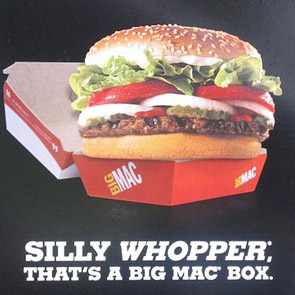
The Average Burger King Outlet Earns Half As Much As A McDonald’s. Why?
Competitors McDonald’s and Burger King sell similar food to similar customers, and both use a franchise business model. Yet, on average, a McDonald’s restaurant takes in about twice as much as the average Burger King restaurant. Why is that? Well, for starters, that creepy king mascot of theirs was driving women and children away. [More]
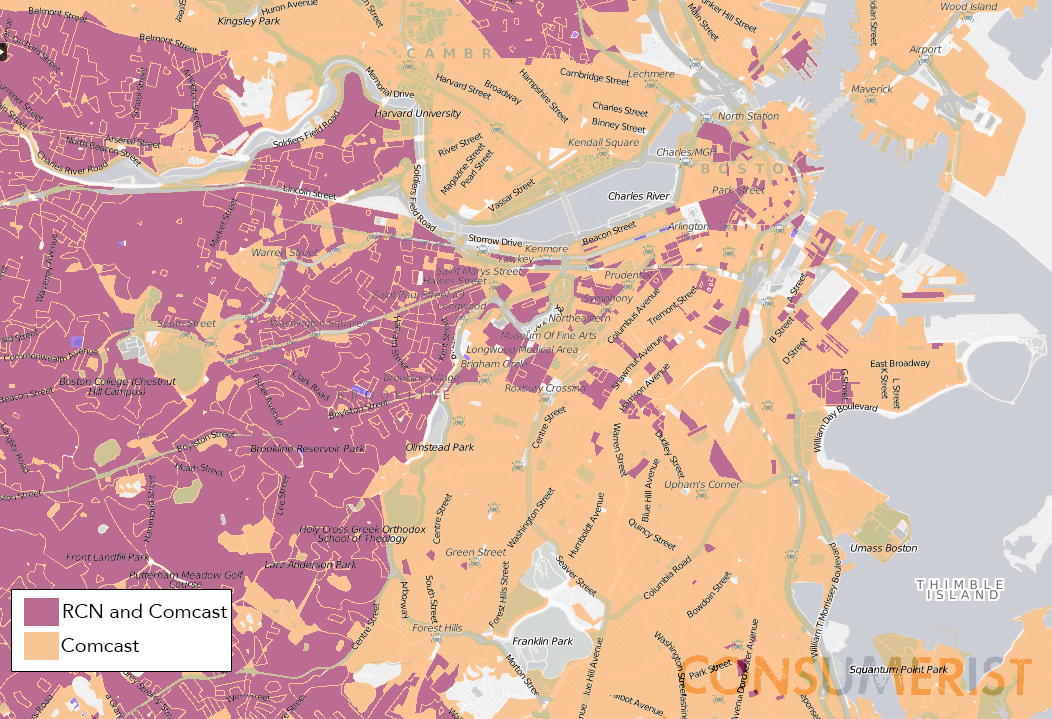
Here’s What the Lack of Broadband Competition Looks Like on a Map
When announcing Comcast’s intention to buy Time Warner Cable, Comcast CEO Brian Roberts called cable a “highly competitive and dynamic marketplace.” Dynamic it might be, but competitive it isn’t. Most of us live a local monopoly, cable-wise: it might be a Comcast city or a Time Warner town, but we don’t have that much choice with our providers. And those companies also, hugely, provide our broadband access. So what does 75% reach or a 15% market share really look like, to a city and the people in it? [More]

Utah Lawmaker Apparently Tired Of Residents Having Fast, Competitive Internet Access, Proposes Law To Stop Expansion
Municipal fiber networks might just be the wave of the future when it comes to speedy internet access. The cable companies already providing internet access, though, aren’t always so keen on the competition–and those companies have deep pockets and access to lawmakers’ ears. And so now Utah becomes the latest state to try legislative measures to bar its cities, towns, and counties from diving into the ISP market. [More]
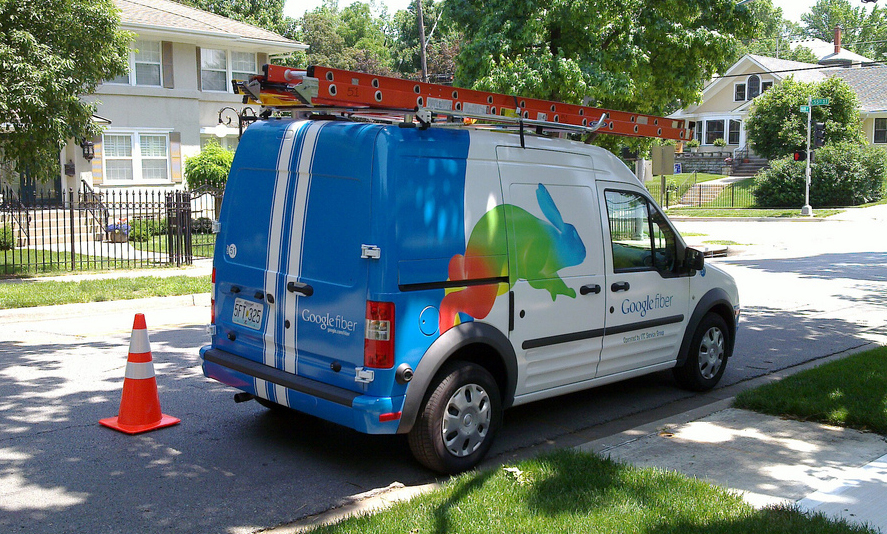
Kansas Legislature Wants To Stop Any Other Kansas Cities From Getting Google Fiber
The Kansas state legislature is currently considering a bill that would prohibit municipalities in that state from building out their own municipal broadband networks. Completely coincidentally of course we’re sure, Kansas City is home to the country’s first Google Fiber municipal network. [More]

Evil Ice Cream Truck Stalks Competition, Offers Customers Free Treats, Gets Arrested
If you come at the ice cream truck king of Gloversville, N.Y., you best not miss. When another mobile ice cream vendor dared wander onto his territory, the owner of a local frozen treat franchise wouldn’t stand for it. Police say that he tailed a rival’s truck, offering free ice cream to anyone who tried to make a purchase from the other vehicle. The ice cream man was determined to be the only turkey in this straw. [More]

Verizon Wants To Take On Netflix In Entertainment Streaming
Dipping its toes into the waters inhabited by Netflix and Amazon, Verizon is planning to launch its own streaming video system. The company’s aggressive plans call for its service to potentially reach 85 million households. [More]

Police Crack Down On Pennsylvania Ice Cream Truck Turf War
Police had to give a stern lecture to a pair of dueling Uniontown, Penn. ice cream truck drivers who were apparently involved in an escalating battle over territory. [More]

TWC Offers New Cheaper Cable Package
Time Warner is offering a new tier of cable package called “Essentials” with fewer channels and a lower price. [More]

Video: Ice Cream Men Clash In Street Brawl
New York City ice cream men are apparently pretty territorial about their spots. Last week two frozen treat dispensers got into a street brawl over truck positioning and branding that would have made Ken and Ryu blush. [More]
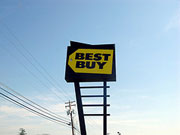
Best Buy To Peddle Its Own Mobile Broadband Service
In a recent Sunday ad, Best Buy pimped Best Buy Connect, its upcoming mobile internet service. [More]
Apple: 10 Million CDMA iPhones On Order – For Verizon, Perchance?
This minute’s latest rumor is that the can you hear me now guy could be put to work testing iPhones soon. DigiTimes reports that Apple has placed an order with Taiwan-based Pegatron for CDMA iPhone that could reach up to 10 million units. CDMA devices don’t work on AT&T’s GSM network. Verizon’s network is CDMA. [More]
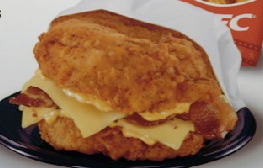
The KFC Double Down: What A Restaurant Does When It Gets Desperate
It seems like the best promotional campaigns for KFC in the past few years have been on South Park, and that’s despite the fact that Cartman is the chain’s most vocal supporter. An AdAge article today points out that Chick-Fil-A has been eating KFC’s lunch for a while now, and so far every stunt KFC has pulled–name changes, PR-engineered recipe events, botched giveaways, getting Oprah’s blessing–hasn’t stopped the restaurant from losing customers.That’s right: your lack of interest in KFC is what created this bundle of cheesy fried-fried in the first place. [More]

Blame Manufacturers For Annoying Hidden Prices Online
Have you been noticing more and more lately that no matter which online retailer you visit, you have to add the item to your shopping cart to see the price? Blame it on manufacturers, who are taking advantage of a 2007 Supreme Court ruling to be more aggressive about controlling pricing online, writes the New York Times. [More]

Restrictive Monsanto Seed Contracts Investigated
An AP investigation examines the cofidential contracts between Monsanto, which makes 90% of the world’s genetically engineered seeds, and the famers and smaller seed companies it bends to its will with extremely restrictive licensing agreements. [More]



